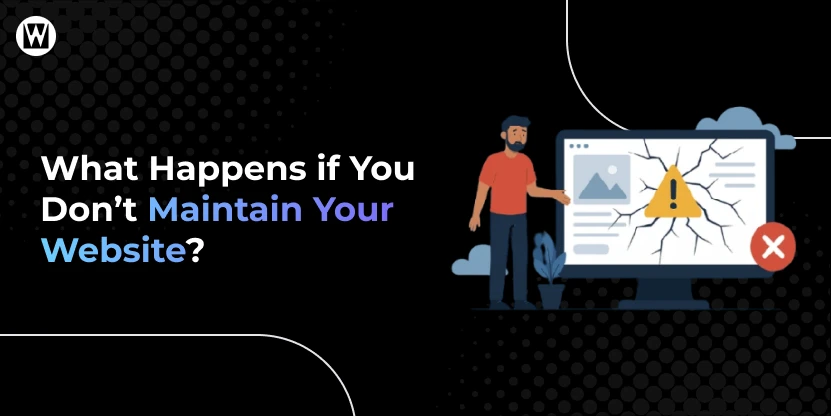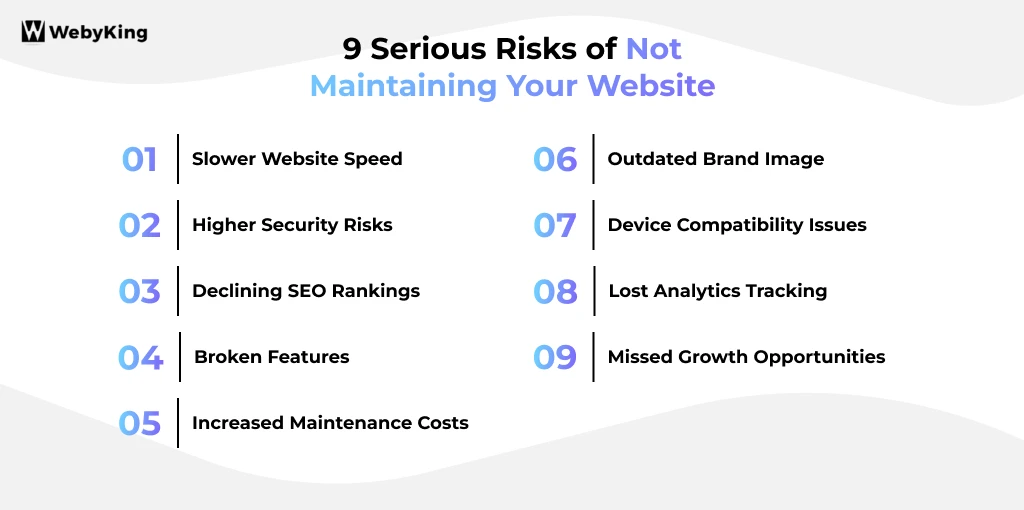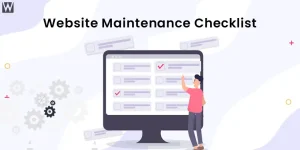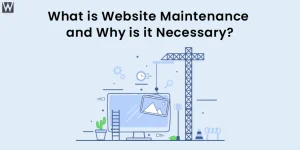What Happens if You Don’t Maintain Your Website?

Let’s face it: If you don’t maintain your website, it can become slow, outdated, and vulnerable to security threats. Broken links, poor user experience, and lower search rankings can quickly follow. This not only drives visitors away but also damages your brand’s credibility and trust.
Your website is often the first impression people have of your business, so what happens when you stop keeping it in shape? Just like a storefront with broken windows and flickering lights, a neglected website turns visitors away before you even get the chance to connect. It may still exist, but it’s not working for you.
According to a Stanford study, 75% of users judge a company’s credibility based on its website design. That means if your site is outdated, slow, or full of errors, you’re likely losing trust—and customers—without even knowing it.
In this blog, we’ll break down exactly what can go wrong when you don’t maintain your website, and why regular updates are essential to staying competitive online.
What Are the Risks of Not Maintaining Your Website?
Ignoring website maintenance comes with serious consequences that go far beyond just a little outdated content or a broken link. Your website is often the first place people go to learn about your business, and if it looks or functions like it hasn’t been touched in months, it sends the wrong message.
Neglecting this can quietly damage your reputation, reduce visibility in search engines, and even cost you more money in the long run. Here’s what can happen if you stop updating your website:

Website Speed Slows Down
When your website isn’t updated regularly, it often becomes bloated with old plugins, scripts, and outdated code. This causes your website speed to suffer, and visitors don’t wait around. 53% of mobile users abandon sites that take longer than 3 seconds to load, according to Google.
Slow load times hurt user experience, damage your SEO, and make it harder to keep people on your site long enough to convert. Regular maintenance clears out unnecessary elements and keeps your site running fast and smooth.
You Become a Target for Security Threats
Outdated software is one of the most common ways hackers gain access to websites. If you’re not regularly updating your CMS (like WordPress), themes, and plugins, you’re leaving doors wide open for malware, phishing, or even full-on site takeovers.
Applying security patches, updating software, and monitoring for vulnerabilities are essential parts of website maintenance that help reduce the risk of attacks. Think of it like digital insurance for your business — and peace of mind for you and your users.
Your SEO Rankings Can Drop
Search engines like Google reward websites that are secure, mobile-friendly, and regularly updated. When your site is outdated, slow, or filled with broken links, it tells Google that your content may no longer be reliable.
Over time, your rankings slip, making it harder to promote a website effectively. You could be producing great content, but if your site isn’t optimized through ongoing maintenance, fewer people will find it.
Features May Break Without Warning
The key features a website should have — like contact forms, maps, product galleries, payment systems, and pop-ups — can break when you stop maintaining the tools that power them. What worked last year might not work today if the platform or third-party tools have changed.
Imagine a potential customer trying to book a service or submit an inquiry, only to be met with an error. That one broken feature could mean a lost sale — and worse, they might not give you a second chance.
Website Maintenance Cost Rises in the Long Run
It might seem cheaper to “leave it alone” and skip routine updates, but the reality is this: when problems build up, fixing them becomes much more expensive and time-consuming. A hacked website or a complete crash could cost hundreds — or even thousands — to recover.
Routine updates and backups help prevent larger, more expensive problems over time. In the long term, a small investment in maintenance saves you from large, unexpected bills.
Your Brand Starts to Look Outdated
Your website is a reflection of your brand. If it looks like it hasn’t been updated in years, visitors may assume you’re no longer active or just not professional. Broken images, expired promotions, or content from 2020 aren’t just embarrassing — they cost you credibility.
Staying current with content and visuals shows that your business is alive, engaged, and trustworthy. First impressions online are everything, and a neglected website sends the wrong one.
You Lose Compatibility with New Devices
Technology evolves fast. Without regular updates, your website may not work well on the latest smartphones, tablets, or web browsers. That means visitors could experience layout issues, missing buttons, or glitchy navigation — none of which inspire confidence.
A responsive, mobile-friendly design is one of the key features a website should have, and without maintenance, that can quickly fall apart.
You Could Lose Tracking and Analytics
Analytics tools like Google Analytics or Facebook Pixel help you understand your visitors and make smart marketing decisions. But if your code snippets break during platform updates, you could be flying blind without even knowing it.
This can be especially damaging if you’re running ads or trying to track conversions. Periodic reviews help ensure tracking tools remain accurate after platform or browser updates.
You Miss Opportunities to Grow
Web platforms and tools are constantly releasing new features — better layouts, faster-loading scripts, smarter SEO tools, and more. When you stop updating your site, you miss out on these improvements that could boost performance, increase conversions, or make your team’s job easier.
For example, new integrations could automate bookings or improve checkout flow. But if you’re not maintaining the site, you’ll never know what’s possible — and your competitors might get there first.
Final Thoughts
So, we’ve just walked through what happens when you don’t maintain your website — slow loading times, broken features, SEO issues, security risks, and honestly… a not-so-great experience for your visitors. And let’s be real, in today’s online world, your website is your first impression. Neglecting it is like letting your shop gather dust while customers peek through the window.
But here’s the good news: you don’t have to juggle it all on your own. Why not let WebyKing handle the heavy lifting for you? From regular updates to speed boosts, plugin checks to security scans — we’ve got your website’s back.
Let’s get in touch and we’ll make sure your site stays fast, secure, and ready to impress.
Because a well-maintained website isn’t just good for business — it is business. Let’s keep it that way.
Frequently Asked Questions
How often should I maintain my website?
Ideally, you should check and update your website at least once a month. If it’s a busy site (like a blog or eCommerce store), weekly updates are even better. Regular checkups keep things running smoothly.
Can an outdated website hurt my SEO?
Yes, absolutely. Search engines like fresh, secure, and fast-loading websites. If your site is outdated, it can drop in rankings, making it harder for people to find you.
Why is my website loading slowly all of a sudden?
It could be due to outdated plugins, too many images, broken code, or even a poor hosting plan. Regular maintenance helps you spot and fix these issues before they slow things down.
How does a lack of website maintenance affect user experience?
When your site isn’t maintained, things break — like forms, buttons, or images. Pages may load slowly, and outdated info confuses visitors. It just feels… off, and that drives people away.
Will not updating plugins or themes break my website?
Eventually, yes. Outdated plugins or themes can stop working, clash with new features, or even crash your site. Updates are like tune-ups — they prevent bigger problems down the road.
What are the steps in website maintenance?
Here’s a simple breakdown:
- Backup your site
- Update plugins, themes, and core software
- Fix broken links or images
- Check for speed and mobile issues
- Review and update content
- Scan for security threats
- Test all forms and features
Ravi Makhija, the visionary Founder and CEO of WebyKing, is a seasoned digital marketing strategist and web technology expert with over a decade of experience. Under his leadership, WebyKing has evolved into a premier full service web and marketing agency, delivering innovative solutions that drive online success. Ravi’s deep understanding of the digital landscape combined with his passion for cutting-edge technologies empowers him to consistently exceed client expectations and deliver results that matter.


![How Much Does Website Maintenance Cost [A Detailed Pricing Guide] Featured Image on Website Maintenance Cost](https://www.webyking.com/wp-content/uploads/2022/04/website-maintenance-cost-300x150.webp)











